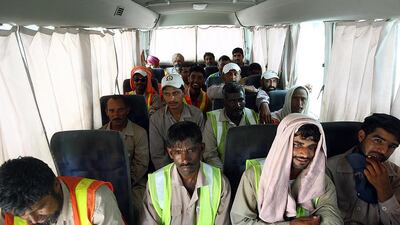DUBAI // A 12-hour shift on a building site can be exhausting and dangerous work, with the chance of serious injury a constant worry.
But labourers building the UAE’s cities say it is the daily bus trip they fear the most.
Concerns about safety on the long drive to and from labour camps have been heightened after 13 workers were killed in crash on Emirates Road in Dubai last week.
“Before this happened we just wanted to reach the camp as quickly as possible because it is so hot in the bus,” said Musafar, 43, a Bangladeshi welder in Dubai’s Sonapur camp, who works at a Jebel Ali site.
“But now all I can think of is that we should not die on the way.
“People are worried and they are telling drivers to slow down. It has scared everyone. But you have to go to work, so you have to travel.”
Most labourers work a minimum of 10 hours a day and are paid overtime for another two hours, for monthly wages totalling between Dh600 and Dh1,000.
But as travel to the worksite often takes between one and two hours, they must be ready at least two hours before their shift begins.
“If it is a 6am to 6pm shift, then they have to report at 4am because the bus will take two hours to reach the site and, in the evening, they leave the site at 6pm and only reach camp at 8pm,” said Ashraful, 24, a site supervisor from Bangladesh.
“These four hours daily are wasted so they should get an extra allowance for this time, shouldn’t they?
“People do suffer a lot and there is sadness and disappointment. Sometimes it is too hot to even sit in the bus because even with the windows open, the air is hot.
“Even before summer on a usual day, the temperature is 40°C to 42°C, so people get depressed. But what does one do?
“You need the job so you keep on working. Then after coming to the camp, you need to shower and then cook – it is very tiring.”
The recent accident has made workers more alert during their commute.
“People are scared and we have been told we have to be on the watch,” Ashraful said.
“The labourers check if the fire extinguisher in the bus is working properly.
“Driving with mobile phones is not allowed but before people were not so strict. Now after the accident, if a driver is speaking on phone, people will report him.”
The construction company for which Ashraful works fines drivers between Dh250 and Dh500 if they use their phone while at work.
A driver can be suspended for three days if he has consumed alcohol and reported for duty.
“People are scared about accidents because there were two accidents recently so they are reporting any wrong behaviour to staff,” Ashraful said. “It’s for safety.”
Stricter government regulation over bus transport for workers would force companies to comply, labourers said.
“There are more people and less seats,” said Rana, 36, a Pakistani construction worker who lives in a Sharjah camp. “Buses are usually overloaded to fit more people. They keep chairs in the middle and this is dangerous if the bus jerks.
“The bus can fit 60 to 65 people comfortably, but 80 people are usually fitted inside. This is routine.
“For a short journey it is OK, but very tiring and hot when people travel from our Sharjah camp to work in Ras Al Khaimah or Fujairah.
“We don’t need seat belts in labour buses but what we need, especially in summer, is an air conditioner.
“People work the whole day picking up loads of steel, there should be better transport. When they get into a bus, it is just too hot.”
rtalwar@thenational.ae


